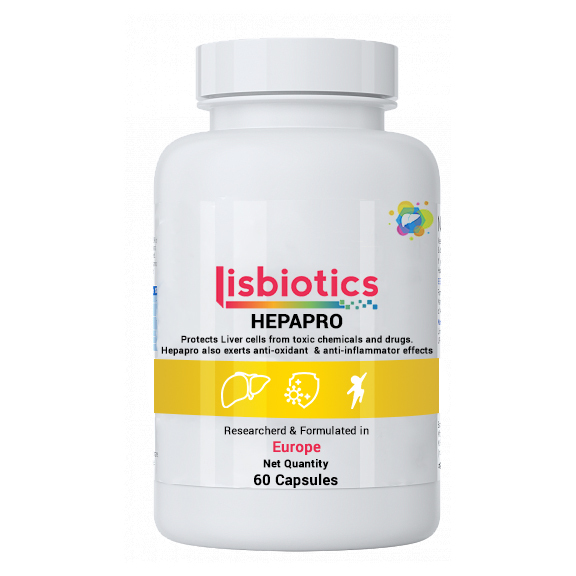Lisbigut
Lisbigut
Lisbigut has been designed for avoiding dysbiosis that can be defined as a reduction in microbial diversity and a combination of the loss of beneficial bacteria such as Bacteroides strains and butyrate-producing bacteria. From: Textbook of Natural Medicine (Fifth Edition), 2020
Dysbiosis can cause the cells of the intestine (enterocytes) that are bound together to begin to separate and bacteria and toxic substances can then enter the body, leading to disease.
Many factors can harm the beneficial members of the gut microbiome, including antibiotic use, psychological and physical stress, alcohol , diarrhea, recurrent constipation, and dietary changes.The dysbiosis play a rolein myriad disease conditions, including GIT disorders like bloating, diarrhoea or constipation, irritable bowel syndrome (IBS) and inflammatory bowel disease (IBD),as well asmore systemic conditions such as rheumatoid arthritis (RA)and ankylosing spondylitis, Parkinson or Alzheimer.

A correct blend of probiotics may avoid this problem or correct it. In Lisbiotics our multidisciplinary team has chosen a blend of bacterias that increase the microbial diversity, using a series of bacteria that produce the conditions to have a microbiota suitable for our organism.
Lisbigut contains Lactobacillus acidophilus , Bacillus clausii, Bacillus coagulans and Saccharomyces boulardi.
Our technicians made a formula that will contain the strains mentioned protected so it will not be attacked by the gastric acids and will also resist alive several months in the capsules maintaining its activity.
References
- Fasano A. All disease begins in the (leaky) gut: role of zonulin-mediated gut permeability in the pathogenesis of some chronic inflammatory diseases. F1000Res. 2020 Jan 31;9:F1000 Faculty Rev-69. doi: 10.12688/f1000research.20510.1. PMID: 32051759; PMCID: PMC6996528.
- Hawrelak JA, Myers SP. The causes of intestinal dysbiosis: a review. Altern Med Rev. 2004 Jun;9(2):180-97. PMID: 15253677.
- Acosta-Rodríguez-Bueno CP, Abreu Y Abreu AT, Guarner F, Guno MJV, Pehlivanoğlu E, Perez M 3rd. Bacillus clausii for Gastrointestinal Disorders: A Narrative Literature Review. Adv Ther. 2022 Nov;39(11):4854-4874. doi: 10.1007/s12325-022-02285-0. Epub 2022 Aug 26. PMID: 36018495; PMCID: PMC9525334.
- Banerjee, Gautam &Unilever,. (2011). Enhancement of natural killer cell activity in immuno-compromised elderly subjects by bacillus coagulans. International Journal of Probiotics and Prebiotics. 2011 December Vol 6
- Maity C, Gupta PhD AK, Saroj DB, Biyani A, Bagkar P, Kulkarni J, Dixit Y. Impact of a Gastrointestinal Stable Probiotic Supplement Bacillus coagulans LBSC on Human Gut Microbiome Modulation. J Diet Suppl. 2021;18(6):577-596. doi: 10.1080/19390211.2020.1814931. Epub 2020 Sep 8. PMID: 32896190.Ritchie ML, Romanuk TN. A meta-analysis of probiotic efficacy for gastrointestinal diseases. PLoS One. 2012;7(4):e34938. doi: 10.1371/journal.pone.0034938. Epub 2012 Apr 18. PMID: 22529959; PMCID: PMC3329544.
- McFarland LV. Systematic review and meta-analysis of Saccharomyces boulardii in adult patients. World J Gastroenterol. 2010 May 14;16(18):2202-22. doi: 10.3748/wjg.v16.i18.2202. PMID: 20458757; PMCID: PMC2868213.
- MélanieBeausoleil, Nadia Fortier, StéphanieGuénette, Amélie L’Ecuyer, Michel Savoie, Martin Franco, Jean Lachaîne, Karl Weiss, “Effect of a Fermented Milk Combining Lactobacillus Acidophilus CL1285 and Lactobacillus Casei in the Prevention of Antibiotic-Associated Diarrhea: A Randomized, Double-Blind, Placebo-Controlled Trial”, Canadian Journal of Gastroenterology and Hepatology, vol. 21, Article ID 720205, 5 pages, 2007. https://doi.org/10.1155/2007/720205
